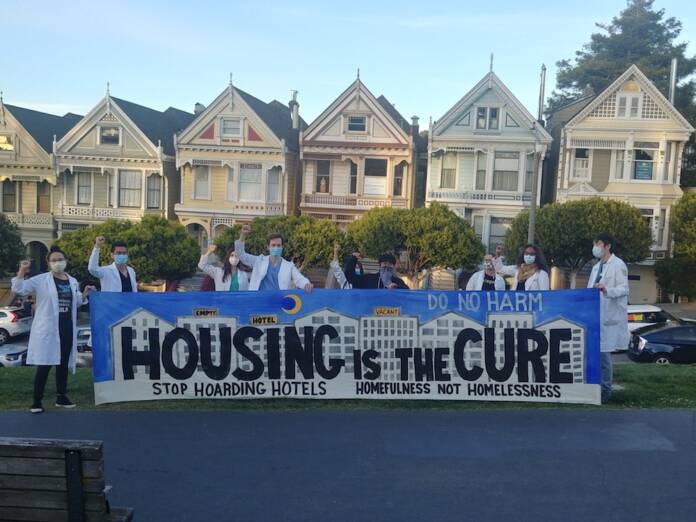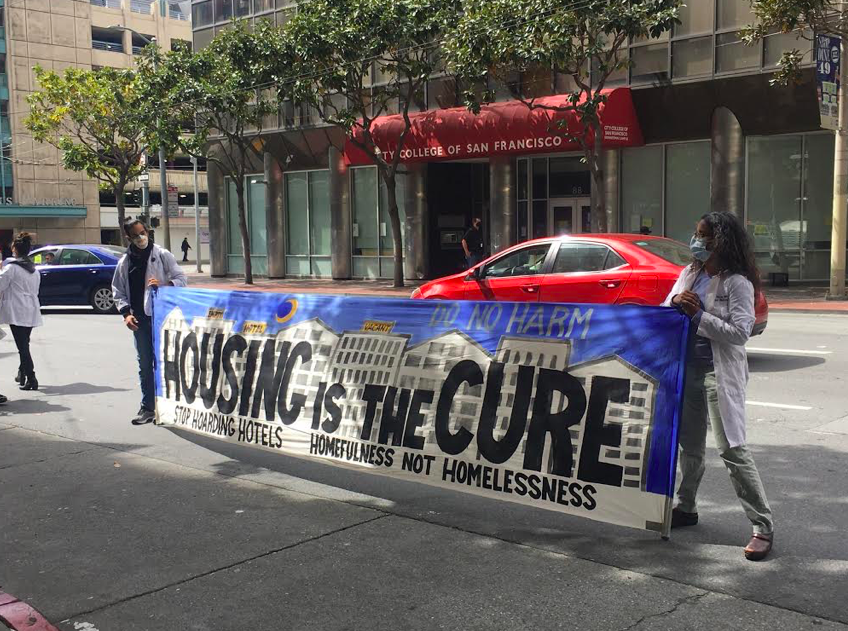
A California Court of Appeal panel yesterday heard oral arguments on a lawsuit seeking to block the city from collecting taxes from the biggest corporations in town to fund homeless services – and while it’s often hard to tell from the questioning which direction the court will go, the evidence presented by the city was solid.
The case involves Proposition C, Nov. 2018 ballot initiative that raised gross receipts taxes slightly on companies with revenue of more than $50 million. The $300 million or so a year that it would generate would go for affordable housing and other services to combat homelessness.

The measure passed with 61 percent of the vote – but the ultra-conservative Howard Jarvis Taxpayers Association sued the city, saying that under Prop. 13 (1978) a tax dedicated to one program needs a two-thirds vote.
Mayor London Breed opposed Prop. C, which is one of the reasons this is even an issue. If she had supported it, the measure likely would have received a two-thirds vote and the case would be moot.
Instead, the city can’t spend any of the Prop. C money – not even during this pandemic emergency – until the courts sort out the question.
A Superior Court judge last June sided with the city, but the right-wingers appealed.
The question before the courts is this: While Prop. 13 (and its demon offspring, Prop. 218) clearly state that any dedicated tax measure placed on the ballot by a local government agency needs two-thirds, neither measure mentions anything about citizen initiatives.
That’s why the state Supreme Court, in a 2017 case, ruled that tax initiatives placed on the ballot by the voters themselves, not by any government agency, are exempt from the two-thirds rule.
Justice Jon Streeter asked the rightwingers lawyer, Christopher Skinnell, a direct question: “Does Prop. 13 say that citizen initiatives are included?”
Skinnell: “No, it does not.”
Justice Alison Tucher asked about the legislative history of Prop. 13, including the ballot arguments in favor. “Aren’t the about reclaiming democracy from corrupt politicians?”
Skinnell: “That’s not the exclusive purpose.”
Tucher: “We don’t see any evidence that the voters intended to limit themselves.”
Streeter: “I don’t see why the voters wanted to obliterate self-government when it comes to raising taxes.”
Justice Tracie Brown noted that the plain language of the law says “no local government” can raise taxes without a two-thirds vote. “That doesn’t mean the provision of the electorate,” she said. “Where is there any indicia that in enacting Prop. 218 the voters wanted two different things?”
Deputy City Attorney Wayne Snodgrass, representing San Francisco, noted that Props. 13 and 218 specifically sought to restrict the ability of any “cities, counties, and special districts” to raise taxes without a two-thirds vote. “There is nothing in the law about voters.”
He noted that when there is not an express reference or statement indicating that the voters intended to restrict their own power, the courts are supposed to liberally interpret the initiative laws in favor of citizen power.
Streeter asked why, if these two issues are conflicting, the question hasn’t come up before. “Over all these years, nobody raised this issue,” he said.
Snodgrass noted that the vast majority of local tax measures have been put on the ballot by government agencies. Besides, the 2017 Supreme Court case made the matter clear.
The justices are expected to rule within 90 days. It’s likely that the next step will be the state Supreme Court, and if that court decides to take the case, the city could be unable to spend the money for another two years or so.

